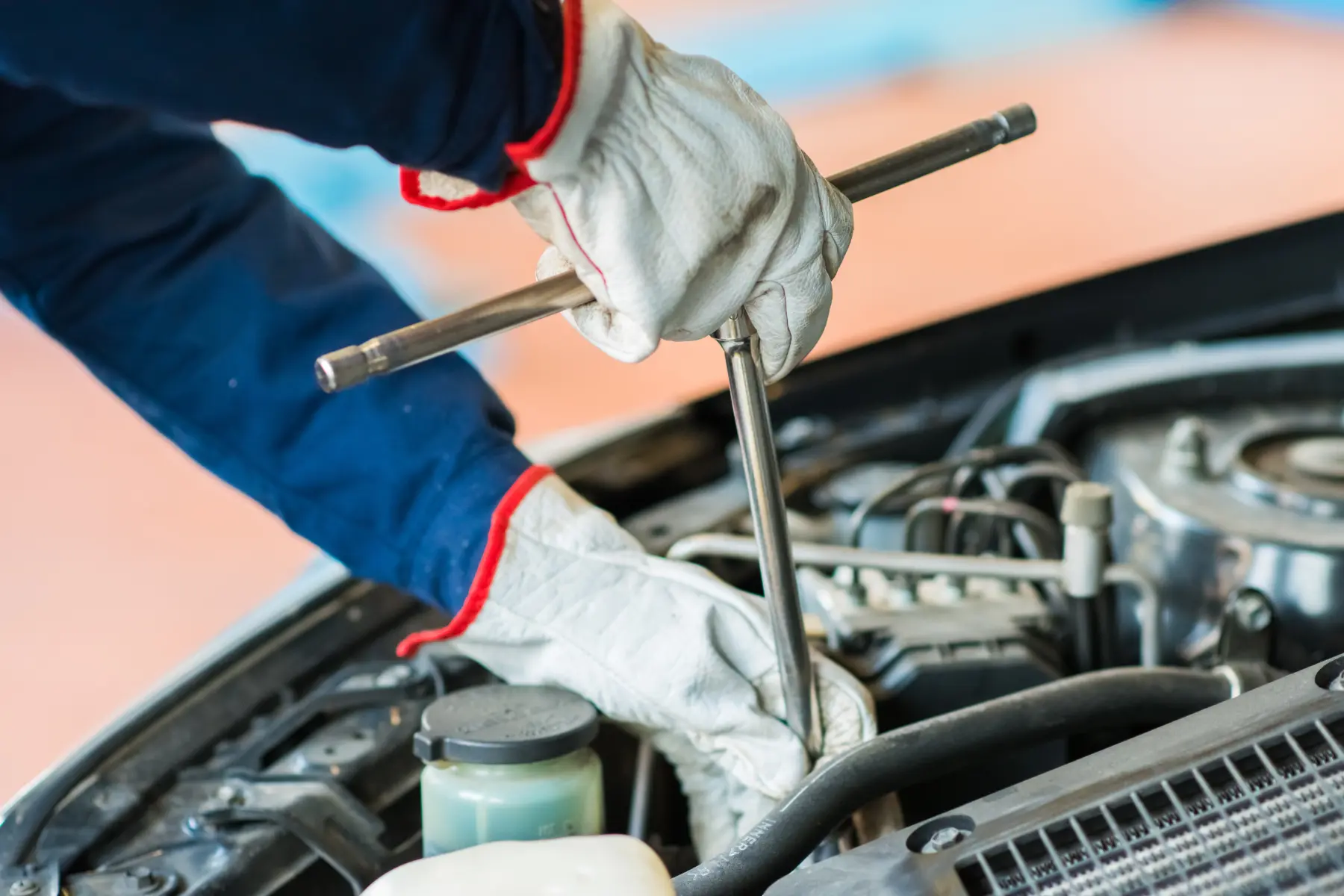About JC Whitney Editorial Team

Meet the JC Whitney Editorial Team, your go-to experts for automotive insights, from in-depth car culture articles to the latest in vehicle tech.
More from JC Whitney Editorial TeamWhen we talk about engine performance, two terms frequently come up: horsepower and torque. But what do they mean? Simply put, horsepower is a measure of how fast a car can perform work, while torque is the force that gets the car moving. Imagine torque as the initial push you give to a swing to start it moving, and horsepower as how fast you can make the swing go after pushing. Both are crucial for understanding how your car performs and enhancing either can lead to a more powerful and responsive vehicle.
Engine Tuning Tips for Beginners
The Fundamentals of Engine Tuning
Engine tuning involves adjusting or modifying the software and hardware settings of your car’s engine to improve its performance. At its core, engine tuning aims to increase the engine’s efficiency, resulting in a notable horsepower boost and torque enhancement. This process can vary from simple adjustments like optimizing the air-to-fuel ratio, to more complex modifications such as upgrading the engine’s components. Understanding the basics of engine tuning is crucial for anyone looking to enhance their vehicle’s performance.
Tools and Equipment Needed for DIY Tuning
Embarking on the journey of DIY engine tuning is an exciting endeavor for car enthusiasts aiming to enhance their vehicle’s performance. Having the right tools and equipment is crucial for success. Here’s a guide to what you’ll need:
- Diagnostic Tool: This tool is indispensable for reading and interpreting the vast array of data from your car’s engine control unit (ECU). It helps identify areas for improvement and ensures you can monitor the engine’s performance before and after adjustments. A high-quality diagnostic tool can pinpoint issues that, once addressed, can significantly improve performance.
- Laptop/Handheld Tuning Device: Depending on your preference and the specific requirements of your tuning software, a laptop or a handheld device is essential for making software adjustments. This technology allows you to modify the engine’s parameters, optimizing performance and efficiency. The choice between a laptop and a handheld device often depends on the tuner’s flexibility and the complexity of the tuning process.
- Mechanical Tools: A comprehensive set of mechanical tools, including wrenches, screwdrivers, and pliers, is vital for undertaking physical modifications to your vehicle. These tools enable you to install new parts, which can work in tandem with your tuning efforts to enhance overall performance.
Having a well-equipped toolbox is the cornerstone of successful DIY tuning, enabling you to tackle a wide array of tasks, from software adjustments to complex hardware installations. Whether you are fine-tuning fuel maps, enhancing turbocharger efficiency, or simply performing routine maintenance to ensure optimal performance, these tools are indispensable.
Common Pitfalls to Avoid in Engine Tuning
When embarking on the journey to boost your car’s horsepower and torque through engine tuning, it’s crucial to be aware of the common pitfalls that can not only hamper performance but also lead to significant engine damage. High-performance modifications such as turbocharging or supercharging increase the engine’s power output but also its demand on the cooling system, fuel delivery, and engine management. Without corresponding upgrades to these systems, you risk overheating, fuel starvation, or even catastrophic engine failure.
Another often overlooked aspect is the importance of regular engine maintenance. Many assume that tuning will override the need for basic upkeep, but the reality is that high-performing engines require even more attention to maintain their condition and performance levels. Regular oil changes, filter replacements, and checking spark plugs and injectors are critical to prevent the build-up of issues that could negate the benefits of tuning. Achieving enhanced performance through engine tuning is more than just increasing power; it’s about balancing upgrades with the necessary support systems and maintenance to ensure longevity and reliability. Adopting a holistic approach to tuning, where you consider the health and efficiency of the entire engine system, is the key to unlocking the full potential of your car’s horsepower and torque.
Boosting Horsepower: Strategies and Techniques
Methods to Increase Horsepower Effectively
Upgrading to a high-performance exhaust system can reduce backpressure, allowing your engine to breathe better and produce more power. Performance upgrades such as cold air intake systems also contribute by providing more oxygen to the engine, which is essential for combustion. Additionally, car engine tuning software options can optimize the engine’s settings for better performance, proving that software tweaks can be just as impactful as hardware modifications.
Role of Exhaust Systems
An optimized exhaust system reduces backpressure, allowing exhaust gases to escape more freely. This reduction in backpressure enables the engine to operate more efficiently, directly contributing to a horsepower boost. Upgrading to a performance-oriented exhaust system is one of the most straightforward and effective ways to enhance your car’s horsepower.
The Impact of Turbochargers and Superchargers
Turbochargers and superchargers are force-feeding systems that increase an engine’s efficiency and power output by pushing more air into the combustion chamber. This additional air allows the engine to burn more fuel, significantly boosting horsepower. While turbochargers use exhaust gas to operate, superchargers are mechanically driven, offering different benefits in terms of power delivery.
Enhancing Torque for Improved Vehicle Performance
Mechanical Modifications to Boost Torque
To boost torque, mechanical modifications can be quite effective. Installing performance camshafts can alter the engine’s valve timing, improving airflow and, consequently, torque output. These modifications, when done correctly, can significantly improve the low-end grunt of your engine, making your car more responsive.
The Advantages of High-Performance Clutches
In the quest to boost your car’s horsepower and torque, upgrading to a high-performance clutch plays a pivotal role in ensuring the engine’s increased power is fully harnessed. While it might seem like a secondary upgrade, a high-performance clutch is crucial for transmitting the enhanced torque to the wheels more effectively and without slippage. When the engine’s torque output exceeds what the stock clutch can handle, the risk of premature wear or even failure escalates. A high-performance clutch combats this by offering a stronger grip and more durable construction, ensuring that the power produced by your engine translates into performance on the road. This upgrade not only maximizes the efficiency of power transfer but also significantly boosts the overall reliability and driving experience of your vehicle, making it an indispensable part of tuning for enhanced engine performance.
Adjusting Gear Ratios for Optimal Torque
Shorter gear ratios can make the car accelerate more quickly by making better use of the engine’s torque at lower speeds. However, this might come at the expense of higher engine speeds at cruising, affecting fuel efficiency. Carefully choosing the right gear ratios can optimize your vehicle’s performance for your specific needs, whether it’s faster acceleration or improved towing capability.
Performance Upgrades: Maximizing Engine Efficiency
Benefits of Performance Air Filters
One of the simplest yet effective performance upgrades is installing performance air filters. These filters are designed to increase airflow to the engine, which can significantly improve combustion efficiency and, consequently, power output. Unlike standard filters, performance air filters allow for higher airflow without compromising filtration efficiency, ensuring that your engine breathes cleaner air for better performance.
Maximizing Fuel Injection Efficiency for Better Performance
Modern fuel injection systems can be fine-tuned to deliver fuel more precisely and at the optimal moment, significantly improving combustion efficiency and power output. Upgrades like high-performance fuel injectors, fuel pumps, and adjustable fuel pressure regulators can all contribute to a more efficient and powerful engine.
Car Engine Optimization Techniques
Utilizing Car Engine Tuning Software
These software solutions allow for precise adjustments to the engine’s control unit (ECU), fine-tuning various parameters such as fuel delivery, ignition timing, and boost pressure for turbocharged engines. This technology offers a relatively cost-effective way to enhance your car’s performance without the need for extensive mechanical modifications.
The Importance of Engine Mapping in Optimization
Engine mapping, or remapping, involves altering the software within the engine’s ECU to optimize performance. The importance of engine mapping in optimization cannot be overstated; it tailors the engine’s behavior to suit specific needs, whether for everyday driving, racing, or towing. Proper mapping can unlock the engine’s true potential, making it one of the most impactful optimization techniques available.
Best Practices for Engine Maintenance and Performance Sustainment
Regular Check-Ups and Diagnostics
Maintaining your vehicle’s performance at its peak requires diligent attention to regular maintenance and the use of sophisticated diagnostic tools. Here’s how to ensure your vehicle operates efficiently and remains reliable:
- Preventive Maintenance: Regular check-ups and maintenance play a crucial role in the early detection and resolution of minor issues before they escalate. By keeping up with routine inspections, you can ensure that your vehicle stays in optimal condition, avoiding the development of larger, more costly problems down the line. This includes oil changes, tire rotations, and brake inspections, which help maintain the vehicle’s performance and safety.
- Modern Diagnostic Tools: As mentioned previously, utilizing the latest in diagnostic technology allows for the accurate identification of inefficiencies or malfunctions within the engine and other critical systems. These tools can pinpoint problems that may not be immediately apparent, enabling mechanics to make precise adjustments and repairs.
- System Optimization: Through regular diagnostic checks, every aspect of your vehicle, from the engine’s performance to the efficiency of electronic components, can be optimized. This ensures that all systems are functioning at their best, contributing to improved overall performance and reliability. Optimization can lead to better fuel efficiency, smoother operation, and enhanced driving experience.
- Cost and Time Savings: Engaging in proactive maintenance and diagnostics can significantly reduce the likelihood of facing major repairs in the future. By catching and addressing issues early, you can avoid the inconvenience and expense of unexpected breakdowns and repairs. This forward-thinking approach not only saves money but also time, as it minimizes the chances of your vehicle being out of commission.
A commitment to regular vehicle maintenance and the use of advanced diagnostics are fundamental to ensuring that your vehicle performs reliably over time. This strategy not only enhances the driving experience but also contributes to the vehicle’s longevity, offering both immediate benefits and long-term value.
Keeping the Fuel System Clean
Over time, deposits can build up in the fuel injectors, fuel lines, and intake valves, leading to reduced fuel efficiency, power loss, and even engine damage. Regularly using fuel system cleaners can help remove these deposits, ensuring that fuel is delivered smoothly. This simple maintenance step can make a noticeable difference in how your car drives and performs, especially in older vehicles.
Monitoring and Replacing Worn Parts
Worn-out spark plugs can cause misfires, poor fuel economy, and reduced power, while a dirty air filter can restrict airflow to the engine. Keeping these parts in good condition ensures that your engine operates at maximum efficiency, providing the best performance and fuel economy possible.
This comprehensive guide has armed you with the knowledge to start enhancing your car’s engine performance. Whether you’re a seasoned mechanic or a passionate enthusiast, there’s always room for improvement. Drive safely, and enjoy the journey of optimizing your vehicle’s performance!
